Three identical capacitors and have a capacitance of each and they are initially uncharged. They are connected in a circuit as shown in the figure and is then completely filled with a dielectric material of relative permittivity . The cell electromotive force (emf) is, . First, the switch is closed while the switch is kept open. When the capacitor is fully charged, is opened and is closed simultaneously. When all the capacitors reach equilibrium, the charge on is found to be . The value of is,
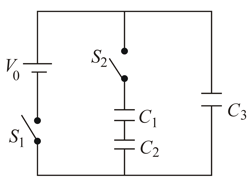


Important Questions on Capacitor and Capacitance
(a) How many excess electrons must be added to one plate and removed from the other to give a parallel plate capacitor of stored energy?
(b) How could you modify the geometry of this capacitor so that it can store of energy without changing the charge on its plates?
Three identical large metallic plates are placed parallel to each other at a very small separation as shown in the figure. The central plate is given a charge . What amount of charge will flow to earth when the key is pressed?
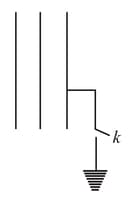
A parallel plate air capacitor is connected to a battery. If the plates of the capacitor are pulled farther apart, then state whether the following statements are true or false.
(a) Strength of the electric field inside the capacitor remains unchanged if the battery is disconnected before pulling the plates.
(b) During the process, work is done by the external force applied to pull the plates irrespective of whether the battery is disconnected or not.
(c) Electrostatic potential energy in the capacitor decreases if the battery remains connected.
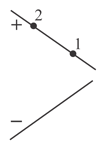
The figure shows the variation of voltage across the plates of two capacitors and versus the increase in charge stored in them. Which of the capacitors has higher capacitance? Give a reason for your answer.
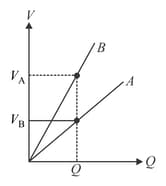
The figure shows the variation of charge versus the potential difference for two capacitors and . The two capacitors have the same plate separation, but the plate area of is double that of . Which of the lines in the figure corresponds to and and why?
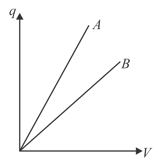
A capacitor of capacitance is charged to a potential difference The terminals of the charged capacitor are then connected to those of an uncharged capacitor of capacitance
(a) Compute the original charge of the system.
(b) Find the final potential difference across each capacitor.
(c) Find the final energy of the system.
(d) Calculate the decrease in energy when the capacitors are connected.
(e) Where did the "lost" energy go?
